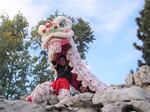
Members of White Lotus Dragon & Lion Dance before performing at Shun Fat Supermarket in Southeast Portland during the 2022 Lunar New Year.
Courtesy Doan Phan
For members of many Asian communities, the Lunar New Year marks the beginning of the spring season, usually at the end of January or beginning of February.
The tradition dates back thousands of years. For fifteen days, families and loved ones gather together to celebrate by lighting fireworks, wearing the lucky color red, hanging lanterns, and of course, watching lion dancing.
Two performers, a head player and a tail player, bring the bright and colorful lion to life through the beats of loud drums, gongs and symbols.
They perform tricks, play with the audience, and pretend to eat lettuce wrapped around li xi, red envelopes that contain “lucky” money.
Nick Lee and Nhan Danh coach at two of Portland’s most popular Lion dance teams. Lee coaches at Portland Lee’s Association Dragon & Lion Dance, while Danh coaches at White Lotus Dragon & Lion Dance.
Lion dancing is a classic part of Lunar New Year celebrations. The performances showcase spiritual and cultural Asian traditions.
“Lion dancing is meant to ward away evil spirits, it’s meant to bring in good luck. Those are the two most important reasons why we have lion dancing during the Lunar New Year,” Danh said.

The White Lotus Dragon & Lion Dance team perform at Shun Fat Supermarket during the 2022 Lunar New Year.
Courtesy Doan Phan
The two teams travel all over, from Oregon to Washington and beyond. They perform in a variety of venues including businesses, cultural centers, and restaurants.
At the beginning of 2020, the troupes maintained a regular live performance schedule. Then in March, the COVID-19 pandemic forced the state to shut down and suddenly, there were no more performances.
“We were kind of on this wave going up and up. And so for last year for us to not get any shows, that was just honestly depressing. I was just sad because the one time of the year where all of our performances are piled up, we weren’t able to do it,” Danh said.
But as the state opened back up, the teams slowly began to perform again. By late 2021, they were able to dance in front of live crowds all over town during events for the Mid-Autumn Moon Festival in September.
Even though the dance troupes couldn’t perform for the 2021 Lunar New Year, Lee said they were still able to keep some customs alive. One tradition was the bai nian, a traditional Chinese blessing of good fortune for the new year.
“We set up a little tent outside, so members could drive up and give donations and then, you know, receive a little, little care package with oranges and some roast pork,” he said. “So at least we were able to keep some traditions alive.”
After not performing in 2021, Danh says the two teams were ready for a big comeback for 2022, complete with a packed schedule of performances.
“To have this year be as packed as it is, and just the preparation that we put into it, it’s gonna be a killer season,” Danh said.
In the aftermath of a year that saw a rise in anti-Asian crimes and rhetoric, Lee said it was more important than ever to pass down time-honored traditions on to the younger generation.
“You can be a strong, confident lion dancer, Asian American. I’m definitely trying to instill a sense of pride and that lion dancing is not weird, but it’s cool. And it’s not something to be ashamed of, but it’s something to be proud about,” Lee said.

Nick Lee, left, and Eric Lee perform a traditional lion dance as part of the Portland Lee's Association Dragon & Lion Dance team.
Courtesy Nick Lee
For nearly 20 years, the Portland Lee’s Association has performed at Lan Su Chinese Garden, one of Portland’s most popular places to watch lion dancing.
“Every Chinese New Year is a two-week celebration and we are booked for multiple days for multiple performances. It wouldn’t be unreasonable for us to perform in the garden maybe 10, 20 times per year,” Lee said.
Along with lion dances, the team also performs a special lighted dragon dance, complete with a Chinese dragon draped with colorful lights.
Elizabeth Nye, Lan Su Garden’s executive director, warmly welcomed the team back with hopes of drawing dwindling crowds back to the garden.
In the last few years, rising crime rates have spurred rising safety concerns in Old Town Chinatown, where the Lan Su Garden is based.
“Drug dealing on our front plaza, to the break-ins, to the vandalism, to the graffiti, to assault. All of those types of incidents we’re continuing to experience. Maybe not as severely as in June, July, August, but it hasn’t been as fast as we’d hoped,” said Nye.
She adds that Lan Su staff have also had to confront individual incidents of racism involving hate speech.
“We’ve had visitors who have come to the garden, paid to enter and upon entry to the garden have made very disparaging racist comments to staff and it’s something internally that we recognize and struggle with,” Nye said.
Nye expressed her appreciation for the dedicated staff and volunteers who keep the garden running, despite the challenges.
“We have volunteers who come in the mornings and dust the cobwebs, and these are volunteers who have been volunteering at the organization since Lan Su opened. And I really think that’s the secret to our success in terms of being able to be here and be open.”
Even with the recent challenges, Nye and Lee want to continue to put on lion dance performances to preserve Asian culture and history.
“Often many of our cultures and many of our communities feel like they’re hidden. And I think it’s important to the entire community to be able to recognize the presence of a very strong and vibrant AAPI community in Portland,” Nye said.

Lighted lotus floats on display at Lan Su Chinese Garden during the Lunar New Year celebration in 2017.
Jessica Martin / OPB
And for Lee, performing lion dance is more than putting on a good performance.
“Lion dancing feeds our soul. We really love it. But also it’s important to the community. A lot of what we do is actually cultural tradition and it does bring a certain type of energy for the new year,” Lee said.
2022 is the Year of the Tiger, which generally symbolizes vitality and strength. Specifically, it’s the Water Tiger which symbolizes, among other things, strength in the arts.
After a rough 2021, that could be a sign for a potentially artful year for Portland’s lion dance performers.
“Despite everything that’s happening and has happened,” says Nahn Danh, ”We’re still here being able to showcase a really beautiful part of our culture.”
